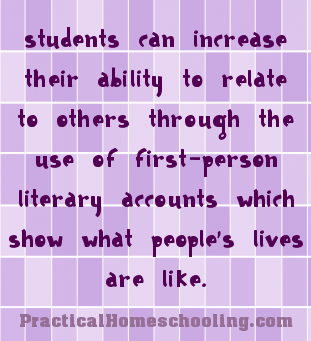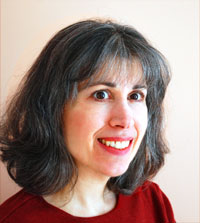Education is a Lifestyle of Establishing Relations
By Karen Andreola
Printed in Practical Homeschooling #22, 1998.
 Students can increase their ability to relate to others through the use of first-person literary accounts which show what people's lives are like.
Students can increase their ability to relate to others through the use of first-person literary accounts which show what people's lives are like.

|
 |
 If you are a new homeschooler, congratulations for having the courage to leave the system. No longer must you view education as only that which is associated with a huge system. You are free to view education as something other than large classrooms, grades, grade levels, worksheets, quizzes and tests.
If you are a new homeschooler, congratulations for having the courage to leave the system. No longer must you view education as only that which is associated with a huge system. You are free to view education as something other than large classrooms, grades, grade levels, worksheets, quizzes and tests.
But if one does not rely heavily upon these things, then what is there left to go on? Charlotte Mason, a 19th-century educational reformer, promoted a philosophy and a method of education. By philosophy we mean what ideas we adopt about teaching and learning. By method we mean how the teaching and learning take place. Charlotte Mason more than one hundred years ago was at work making changes. She had a strikingly different and refreshing view of education. Charlotte resisted systems. Her focus was on developing a philosophy and method of education. She said:
The idea that vivifies teaching . . . is that "Education is a Science of Relations"; by which phrase we mean that children come into the world with a natural [appetite] for, and affinity with, all the material of knowledge; interest in the heroic past and in the age of myths; a desire to know about everything that moves and lives, about strange places and strange peoples; a wish to handle material and to make; a desire to run and ride and row and do whatever the law of gravitation permits. Therefore . . . we endeavor that he should have relations proper to him; not learning slight or incomplete smattering about this or that subject, but plunging into vital knowledge, with a great field before him which in all his life he will not be able to explore. In this conception we get that "touch of emotion" which vivifies knowledge, for it is probable that we feel only as we are brought into our proper vital relations.
Charlotte said that unless our method of education allows children the opportunity to establish relations with many different things, a gallon of teaching will result in only an ounce of learning. A teacher from Charlotte's training college wrote: "We never know just where a child's talents lie, until we give him a variety of opportunities and a wide curriculum. The child is eclectic; he may choose this or that; 'therefore, in the morning sow thy seed, and in the evening withhold not thy hand, for thou knowest not which shall prosper.'"
The opportunity to relate through first-hand experience is not always available or convenient. Our children may not be able to hold a conversation with a deep-sea diver, a geologist, or a person from ancient times; but they can come to know any of these people and their special knowledge through various books they have written. A single author does a wonderful job of helping us form a relation.
My eldest daughter is too young to have experienced World War II first-hand, but she has gotten to know someone who did - Corrie ten Boom. Corrie shared her experiences with my daughter through her book, The Hiding Place. Our history textbook for that year made its introductions, its outlines, its overviews, to that time in history. But it couldn't do what Corrie did (what real books can do); help form a relation.
Charlotte said, "Let them learn from first-hand sources of information - really good books, the best going, on the subject they are engaged upon." Then children must be left to ruminate, must be left alone with their own thoughts. To ask a child then to narrate a selection of what is either read aloud to him or read silently by him is the next step. Let him describe the selection with the details that have impressed him, retelling it from his own point of view. This is one way for a student to be put in contact with ideas from books. Perhaps fresher terminology, in place of our old word education, should be "applied wisdom."
My son likes anything to do with space. So I often borrow picture books from the local library that I think will appeal to him. Grandpa Takes Me to the Moon by Timothy R. Gaffney was one library book that laid around the house for a day. "Nigel," I said to my seven-year-old, "would you like me to read this to you?"
"I've already read it," he answered plainly.
During the previous month, in March of 1997, I had told him that the Hale-Bopp comet was supposed to be appearing in the sky at night. I had read aloud from a delightful library book on comets which traced the history of whom had spotted Halley's comet and when. Nigel listened quietly. Later that same week I heard a dreadful scream from the bathroom, "Ma, come quick!" He was supposed to be getting ready for his bath and the bath water was running. Thinking something was dreadfully wrong, I rushed to him. As soon as I entered the bathroom he pointed out the dark window to the night sky and said excitedly, "There is the Hale-Bopp comet!"
Dad was skeptical because of the brightness of our suburban sky, but came bounding in with his binoculars.
"You're right, that's it!" he agreed.
"Wow, cool!" Nigel hooted.
It might be that he never took a bath that night. I can't remember. But I will always remember that he made a relation with something in the universe. It contributed to his curiosity to learn more about anything in space or that travels through it.
The conventional standardized system of education prides itself in what it covers. "It will all be covered on the test," says the classroom teacher. New homeschoolers have written me saying that they would like to adopt a lifestyle of establishing relations, but are worried they won't be covering everything that the schools cover. But the goal of covering the outlined and overview material of which the usual school book is comprised should not get in the way of relations being made with God, man, and the universe during the early years of school life.
Rather than feel it is our duty to pass children through a system, it should be our duty to ask ourselves how our children can acquire knowledge. If we desire our children to acquire personal knowledge of God, other people, and things, we accomplish this by letting the child fill in the "holes" himself. We can expand their horizons with a wide range of interests and then practice the fine art of education - that art of standing aside to let a child develop the relations proper to him. It is needless to worry about filling in the "holes" if we trust that education is not a system but a method and a lifestyle which consists in the establishment of relations.
It should not be "How much has our child covered?" but "How much does he care?" and "About how many things does he care?" Children go beyond just becoming interested in someone or something with Charlotte Mason's method. They develop a deeper understanding - a greater appreciation - when relations are formed. They become cultured.
With homeschooling, we have a choice of becoming unequally yoked with a system or freed, equipped, and encouraged with the opportunity to not view education as just something between the child's brain and the standardized test, but as something between the child's soul and God. The choice is that of culture versus cram. May you have the courage to make the choice that is in your heart and mind. And may your dreams of what you want education to be in your family come true.
Dean and Karen Andreola are the founders of Charlotte Mason Research & Supply Co. Karen is the author of A Charlotte Mason Companion - Personal Reflections on the Gentle Art of Learning. They publish The Parents' Review, a newsletter dedicated to reviving the educational principles of Charlotte Mason, a nineteenth-century Christian British educator who founded the Parents' National Education Union.